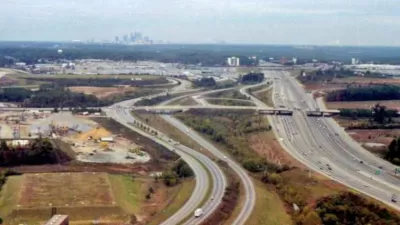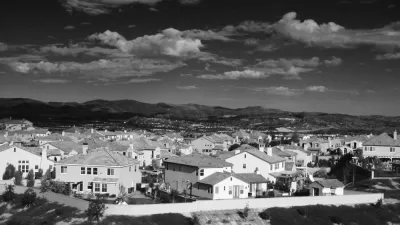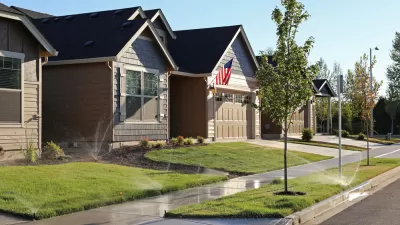Land use and transportation planning decisions provide a framework on which other social policies have created particularly isolating and intractable poverty in the South.
The fourth article in a series published last month by The Washington Post focuses on the barriers of access that make the poverty of the American South particularly isolating and difficult to overcome.
The author of the article, Chico Harlan, begins with story of Lauren Scott, a homeless, 28-year-old mother, relying on public transit to find a new job in Atlanta. On the day Harlan followed her, Scott's job search require 69 stops on a bus, a nine-minute train ride, another 49 stops on a bus, and a quarter-mile walk. According to Harlan, "this was a day much like the others, when the cost of destitution was a job hunt in which even the simplest task — placing an application — required four hours, round-trip, on a bus."
Here Harlan sums up the roots of the daily challenge faced by Scott and others like her:
"In the metropolitan areas of the Deep South, government policies and rising real estate prices have pushed the poor out of urban centers and farther from jobs. Low-income people have, in turn, grown more reliant on public transit networks that are among the weakest of quality in the country. When they search for work, they step into a region where pay tends to be low and unemployment tends to be high."
The magazine feature-style article focuses a lot more on Scott's experience of falling into poverty in the service of making large points about the unique qualities and causes of poverty in the contemporary South—a particularly isolating form of poverty exacerbated by the structure and systems of Southern communities.
FULL STORY: A lonely road

Planetizen Federal Action Tracker
A weekly monitor of how Trump’s orders and actions are impacting planners and planning in America.

Maui's Vacation Rental Debate Turns Ugly
Verbal attacks, misinformation campaigns and fistfights plague a high-stakes debate to convert thousands of vacation rentals into long-term housing.

San Francisco Suspends Traffic Calming Amidst Record Deaths
Citing “a challenging fiscal landscape,” the city will cease the program on the heels of 42 traffic deaths, including 24 pedestrians.

Amtrak Rolls Out New Orleans to Alabama “Mardi Gras” Train
The new service will operate morning and evening departures between Mobile and New Orleans.

The Subversive Car-Free Guide to Trump's Great American Road Trip
Car-free ways to access Chicagoland’s best tourist attractions.

San Antonio and Austin are Fusing Into one Massive Megaregion
The region spanning the two central Texas cities is growing fast, posing challenges for local infrastructure and water supplies.
Urban Design for Planners 1: Software Tools
This six-course series explores essential urban design concepts using open source software and equips planners with the tools they need to participate fully in the urban design process.
Planning for Universal Design
Learn the tools for implementing Universal Design in planning regulations.
Heyer Gruel & Associates PA
JM Goldson LLC
Custer County Colorado
City of Camden Redevelopment Agency
City of Astoria
Transportation Research & Education Center (TREC) at Portland State University
Jefferson Parish Government
Camden Redevelopment Agency
City of Claremont





























